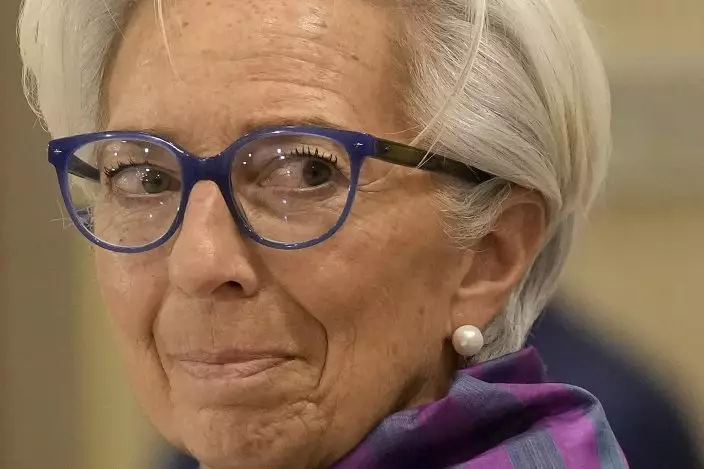Federal Reserve Chairman Jerome Powell said Monday that the central bank is closely monitoring a sharp rise in corporate debt but currently does not see the types of threats that triggered the 2008 financial crisis.
In remarks to a banking conference in Fernandina Beach, Florida, Powell said views about risker corporate debt — known as leveraged lending — range from "this is a rerun of the subprime mortgage crisis" to "nothing to worry about here."
He said his view lies somewhere in the middle. The risks currently are "moderate," Powell said.
His comments followed a Fed report earlier this month that showed riskier corporate debt had grown by 20% in 2018 to $1.1 trillion, prompting the attention of regulators.
Investors are attracted to the riskier corporate debt because it pays higher returns than the very low rates they can receive on safer debt. Much of this debt is grouped together and used to back securities known as collateralized loan obligations.
Powell said that much of this borrowing, because it is "financed opaquely, outside the banking" system has prompted concerns it could "pose a new threat to financial stability," just as similar debt instruments that bundled sub-prime mortgages helped to trigger the 2008 crisis.
However, Powell said he believes regulators learned the lessons of the 2008 crisis, which brought the worst financial crisis in the United States since the 1930s and pushed the country into the deepest recession since the Great Depression.
"The financial system today appears strong enough to handle potential business-sector losses, which was manifestly not the case a decade ago with subprime mortgages," Powell said.
Powell said one key difference between 2008 and now is that the increase in business borrowing is not being fueled by a dramatic asset price bubble like the housing bubble of the past decade.
Improvements in banking regulation, such as annual stress tests for the nation's biggest banks, have allowed regulators to make sure banks are in a position to withstand even a serious economic downturn, he said.
Powell's speech focused on bank regulation issues and did not touch on the future course of interest rates. After raising its key policy rate four times last year, the Fed has left the rate unchanged this year and is projecting no rates hikes for all of 2019.
However, President Donald Trump, seeking to ensure a strong economy going into the 2020 presidential election, has been pressuring the Fed to start cutting rates. While some economists believe the central bank may begin reducing rates later this year, other analysts think the more likely outcome is no rate changes for the entire year.
The Federal Reserve must move faster than it has in the past to rein in high inflation, Chair Jerome Powell said Thursday, signaling that sharp interest rate increases are likely in the coming months, beginning at the Fed's next policy meeting in May.
In a panel discussion held by the International Monetary Fund during its spring meetings, Powell also suggested that “there's something in the idea of front-loading" aggressive rate hikes as the Fed grapples with inflation that has reached a four-decade high.
“So that does point in the direction of (a half-point rate increase) being on the table" for the Fed's policy meeting May 3-4, Powell said. Typically in the past, the Fed has raised its benchmark short-term rate by more modest quarter-point increments. When the Fed raises its rate, it often leads to higher borrowing costs for people and businesses, including those seeking to borrow to buy homes, cars and other costly goods.

FILE - President of the European Central Bank Christine Lagarde looks the Cyprus President Nicos Anastasiades during a press conference after their meeting at the Presidential Palace in the capital Nicosia, Cyprus, Wednesday, March 30, 2022. Lagarde could drop more hints Thursday, April 14, 2022 about when the bank will start raising interest rates, with pressure increasing to follow the United States, United Kingdom and other countries in taking a harder line to combat soaring consumer prices. (AP PhotoPetros Karadjias, File)
Wall Street investors already expect the Fed to raise its key rate by a half-point at its next three meetings, including those that will occur in June and July. Powell's comments Thursday underscored those expectations.
That would be the fastest tightening since 1994, when the Fed raised its rate by 1.25 percentage points over the course of three meetings.
By contrast, Christine Lagarde, president of European Central Bank, who took part in Thursday's discussion, sounded a much more cautious note. Inflation in the 19 countries that use the euro reached 7.5% last month, compared with a year earlier, the highest level since records began in 1997.
Yet Europe's economy faces a greater threat from Russia's invasion of Ukraine, which has sent food and particularly energy prices on the continent soaring and has weighed more on its economic growth than in the United States.
Lagarde said the ECB, at its next meeting in June, would decide when to end its program of bond purchases, which are intended to lower long-term interest rates. The Fed completed a similar effort in March. The ECB has set the July-September quarter as a target to stop buying bonds but hasn't been more specific.
One reason for Lagarde's caution, she said, is that about half of Europe's inflation is driven by high energy prices. Typically, interest rate policies can do little about such supply shocks.
“Our economies are moving at a different pace,” Lagarde said, referring to Europe and the United States, where growth has been faster. “Our inflation is fed by different components.”



